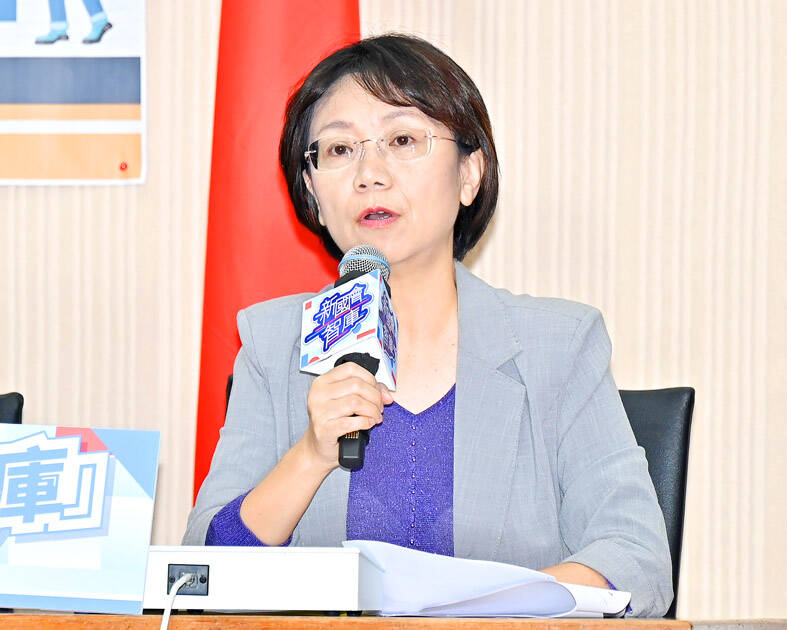Taiwan’s sovereignty and national security are in danger of being undermined from within by a proposed amendment from Chinese Nationalist Party (KMT) Legislator Weng Hsiao-lin (翁曉玲) that would allow military and key government officials to salute China’s national flag, sing the Chinese national anthem and engage in other actions that recognize Beijing government’s political authority, Democratic Progressive Party (DPP) lawmakers said.
Weng’s proposal amounts to opening the door for Taiwan’s retired military generals to take up Chinese propaganda warfare and ‘united front” (統戰) efforts by Beijing to subvert Taiwanese sovereignty, DPP Legislator Puma Shen (沈伯洋) said.
“We see these actions as treason ... to sell out Taiwan to China,” Shen said, adding that Weng’s proposal is the opposite of efforts by DPP lawmakers to safeguard national security against infiltration and subversion by China.

Photo: Tu Chien-jung, Taipei Times
DPP Legislator Hung Sun-han (洪申翰) said that Weng “is dismantling the protective walls safeguarding Taiwan national security, by proposing to remove the laws protecting our national sovereignty.”
Weng in her heart wants to sing the Chinese national anthem and identifies China as her motherland, Hung said, asking whether other KMT officials support Weng’s proposal or view it as representative of the KMT’s party platform.
New Power Party Chairwoman Claire Wang (王婉諭) separately accused Weng of “working in Taiwan’s legislature as a foot soldier for China.”
She added that Weng’s proposal to permit retired generals to show loyalty to Chinese government “is a grave insult to all Taiwanese taxpayers who pay a portion of their hard-earned income toward the generous pensions of these military officials.”
“I want to know if KMT Chairman Eric Chu (朱立倫) supports Weng’s proposal, which severely endangers Taiwan national sovereignty, and if the whole party agrees with it,” Wang said.
“Are KMT members not aware that China’s political doctrine calls for a military invasion of Taiwan?” she said.
Weng referred to her proposal as a “individual human rights” and “freedom of expression” issue. Earlier this week, she collected sufficient signatures from fellow KMT legislators to propose removing Article 9-3 of the amended Act Governing Relations between the People of the Taiwan Area and the Mainland Area (台灣地區與大陸地區人民關係條例).
The article imposed a ban on active-duty military personnel and retired military personnel of major general or higher rank from engaging in acts such as saluting China’s national flag or its emblems, singing Chinese anthems or any other behaviors that recognize China’s political authority.
The same restrictions apply to senior civilian officials in the Ministry of Foreign Affairs and the Mainland Affairs Council, as well as senior officers in national security agencies.

Nipah virus infection is to be officially listed as a category 5 notifiable infectious disease in Taiwan in March, while clinical treatment guidelines are being formulated, the Centers for Disease Control (CDC) said yesterday. With Nipah infections being reported in other countries and considering its relatively high fatality rate, the centers on Jan. 16 announced that it would be listed as a notifiable infectious disease to bolster the nation’s systematic early warning system and increase public awareness, the CDC said. Bangladesh reported four fatal cases last year in separate districts, with three linked to raw date palm sap consumption, CDC Epidemic Intelligence

Two Taiwanese prosecutors were questioned by Chinese security personnel at their hotel during a trip to China’s Henan Province this month, the Mainland Affairs Council (MAC) said yesterday. The officers had personal information on the prosecutors, including “when they were assigned to their posts, their work locations and job titles,” MAC Deputy Minister and spokesman Liang Wen-chieh (梁文傑) said. On top of asking about their agencies and positions, the officers also questioned the prosecutors about the Cross-Strait Joint Crime-Fighting and Judicial Mutual Assistance Agreement, a pact that serves as the framework for Taiwan-China cooperation on combating crime and providing judicial assistance, Liang

Reports of Taiwanese going missing, being detained or interrogated, or having their personal liberties restricted in China increased about fourfold annually last year, the Mainland Affairs Council (MAC) said yesterday. Last year, 221 Taiwanese who traveled to China were reported missing, were detained and interrogated, or otherwise had their personal freedom restricted, up from 55 the previous year, the council said. Reopening group tours to China would be risky, as it would leave travelers with no way to seek help through official channels after Beijing shut down dialogue between the associations tasked with handling cross-strait tourism, the MAC said. Taipei’s Taiwan Strait Tourism

SHIFT: Taiwan is evolving from a transit stop into a tourist destination, with more international travelers willing to spend on tours, dining and cultural activities Taiwan rose three places in the World Tourism Barometer to 36th globally in 2024, with international tourism revenue of US$10.028 billion, the Tourism Administration said on Monday. The UN Tourism Organization publication said that its focus has switched from whether a country has returned to pre-COVID-19 levels of tourism to the amount spent by a tourist during an overseas trip. The nation last year welcomed 8.57 million international tourists, about 9 percent more than in 2024, with most tourists coming from Japan, South Korea, and Hong Kong and Macau, all of which accounted for at least 1 million tourists each. During the first